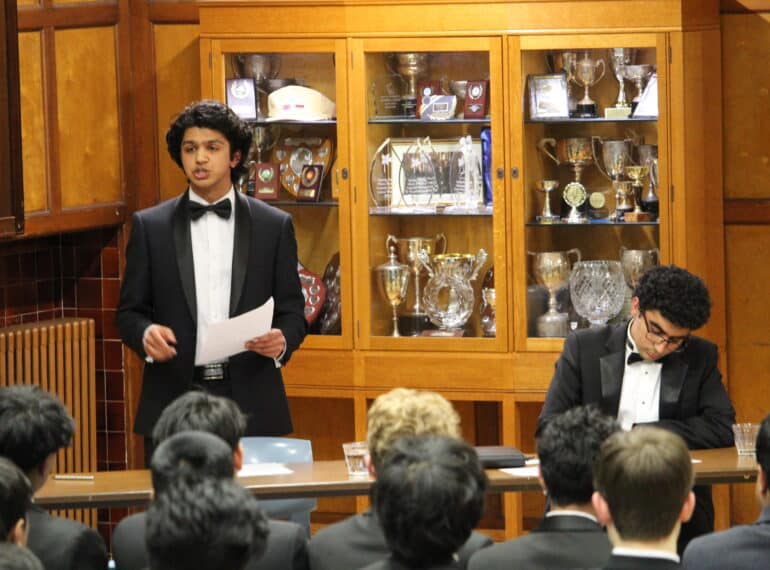
Victory went to the School in this year’s Dinner Debate – the Elizabethan Union’s historic showpiece event.
Combining formal elements with a relaxed atmosphere and plenty of high-calibre debating, the 57th Annual Elizabethan Union Debate saw Year 13 gather in good spirits, enjoying the opportunity to socialise in a different context away from their normal day-to-day routine.
Year 13’s Anish Kumar and Shubh Rathod proposed the motion, This House believes governments are more responsible for climate change than citizens. They were opposed by Old Elizabethans Siddhant Kansal and Mark Markov (both 2015–2022).
Headmaster Neil Enright said: “The Dinner Debate is an event that intentionally bridges the gap from school to university. It blends the formality of black-tie dress, toasts and a traditional Extended Mace debating format with a relaxed atmosphere where the focus is primarily on enjoyment.”
The Elizabethan Union, QE’s debating society, is currently thriving, with debaters enjoying considerable success.
Proposing the toast to the Union, Siddhant Kansal (who was School Captain in 2021) reflected on his time at QE. Regaling his audience with a few anecdotes from his own Sixth Form experience, he also highlighted all the opportunities that were on offer within and beyond the classroom. Whilst QE can occasionally push you hard, it is all worth it and a time you will look back on fondly with great memories, he told the sixth-formers. Siddhant added that QE really does prepare you well for life at university, thanking staff for both pushing him and supporting him.
The debate itself was wide-ranging and packed with content. It was ultimately a victory for the proposition, but by a relatively narrow margin (45% to 37%, with 18% abstaining).
For the School, Anish and Shubh argued that governments have much greater ability to tackle climate change than citizens and should take responsibility for doing so. The role of governments is to protect their citizens, and they are failing in that task if they do not take more significant action. They stressed the importance of government regulation, and gave examples of how quickly action can be taken when there is determination to do so.
The opposition argued that the ability of governments is actually more limited and that big multi-national companies frequently have more influence and impact (and often more wealth). They spoke, therefore, about the power citizens have as consumers in a globalised, largely capitalist, world. Individuals can make choices about what they buy and from where. Mark stated that this power extended to what people eat: he stressed the significant impact of meat-eating on global emissions. The collective impact from these decisions could be profound. The alumni pair also highlighted the power of electorates to put into office people who care about the environment, and said that democratic participation is therefore crucial. They emphasised that, importantly, people do have agency – including everyone who had gathered in the Main School Hall for the debate.
However, the proposition pair noted that much of the world – including many of the largest polluters and contributors to climate change – is not governed democratically. People in those countries have no, or limited, choice in terms of the shape of their government. They argued that it is these governments, rather than their citizens, that have the wrong priorities and are choosing to promote projects and policies that worsen rather than lessen climate change, such as mega-building projects in the Middle East. There was discussion of the US Presidential Election and its potential consequences for climate action, and of the USA’s commitment to the Paris Climate accord.
The floor debate was finely balanced.
- Click on the thumbnails below to view the photos.

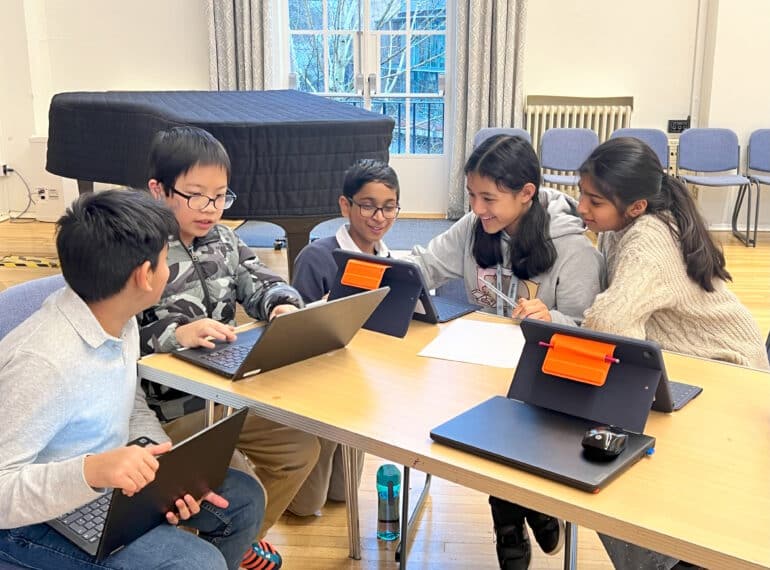
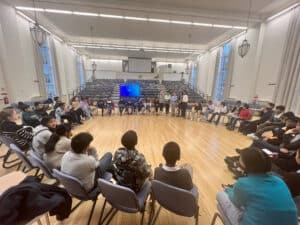 The QE contingent headed to North London Collegiate School for the Year 7 academic symposium, starting the day with a critical examination of social media posts representing different viewpoints and highlighting different scientific data on the atmosphere.
The QE contingent headed to North London Collegiate School for the Year 7 academic symposium, starting the day with a critical examination of social media posts representing different viewpoints and highlighting different scientific data on the atmosphere.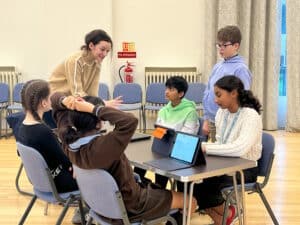 Next, they looked at the impact of different techniques employed in speeches, including the influential contributions made by Thunberg, who customarily challenges world leaders to take immediate action over climate change.
Next, they looked at the impact of different techniques employed in speeches, including the influential contributions made by Thunberg, who customarily challenges world leaders to take immediate action over climate change.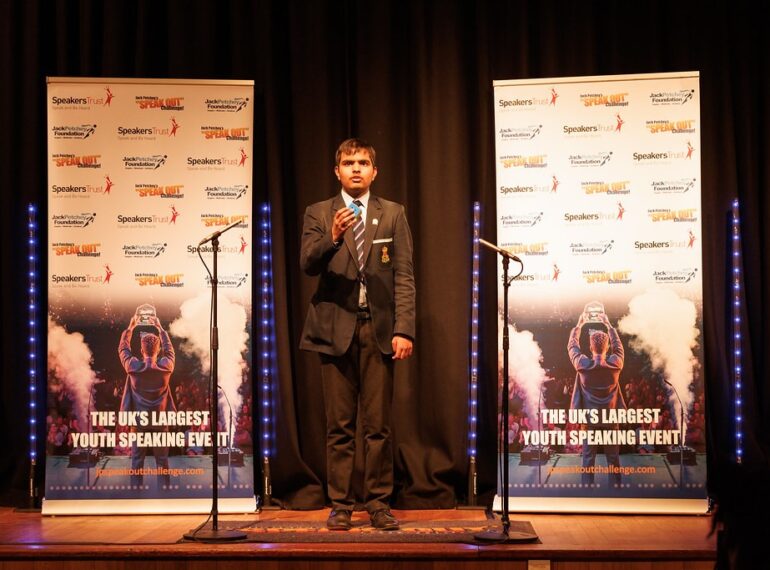
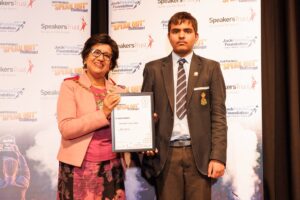 Mohith won his place in the Barnet final of the Jack Petchey Speak Out Challenge by delivering a speech at QE about his determination to up his performance with the Rubik’s cube – all the while actually solving a Rubik’s cube as he spoke.
Mohith won his place in the Barnet final of the Jack Petchey Speak Out Challenge by delivering a speech at QE about his determination to up his performance with the Rubik’s cube – all the while actually solving a Rubik’s cube as he spoke.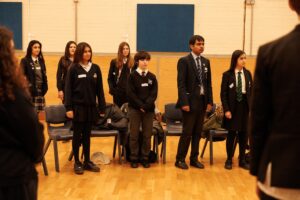 Billed as the UK’s largest youth-speaking event, the Jack Petchey Speak Out Challenge is a programme managed and delivered by Speakers Trust, the UK’s leading public-speaking organisation. It is supported and funded by the Jack Petchey Foundation. Sir Jack Petchey, who is 98 years old, is a businessman and philanthropist who made his fortune in property and timeshare.
Billed as the UK’s largest youth-speaking event, the Jack Petchey Speak Out Challenge is a programme managed and delivered by Speakers Trust, the UK’s leading public-speaking organisation. It is supported and funded by the Jack Petchey Foundation. Sir Jack Petchey, who is 98 years old, is a businessman and philanthropist who made his fortune in property and timeshare.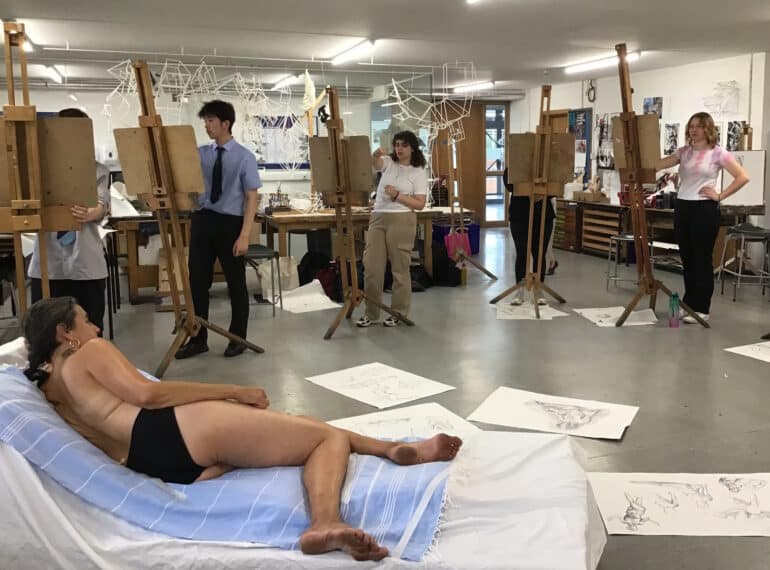
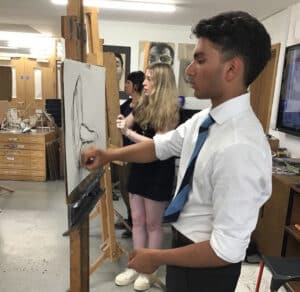 Together with the girls’ participation in filming a promotional video and in a Sketch-off event held as part of QE’s Design Festival earlier in the Summer Term, the life-drawing sessions mark an expansion of the work of the QE Together partnership, which had previously focused on community activities.
Together with the girls’ participation in filming a promotional video and in a Sketch-off event held as part of QE’s Design Festival earlier in the Summer Term, the life-drawing sessions mark an expansion of the work of the QE Together partnership, which had previously focused on community activities.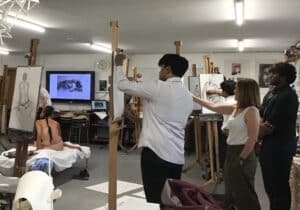 Led by pupils from the two schools, QE Together continued its community activities, with musicians coming together for another concert for care home residents.
Led by pupils from the two schools, QE Together continued its community activities, with musicians coming together for another concert for care home residents. QE Together is one of the newest of QE’s partnerships. The School also has firmly established academic partnerships with North London Collegiate School and The Henrietta Barnett School.
QE Together is one of the newest of QE’s partnerships. The School also has firmly established academic partnerships with North London Collegiate School and The Henrietta Barnett School.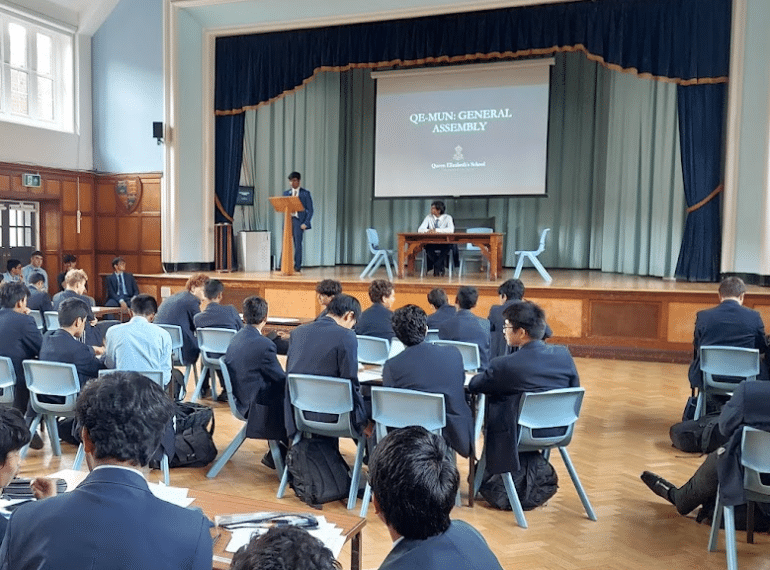
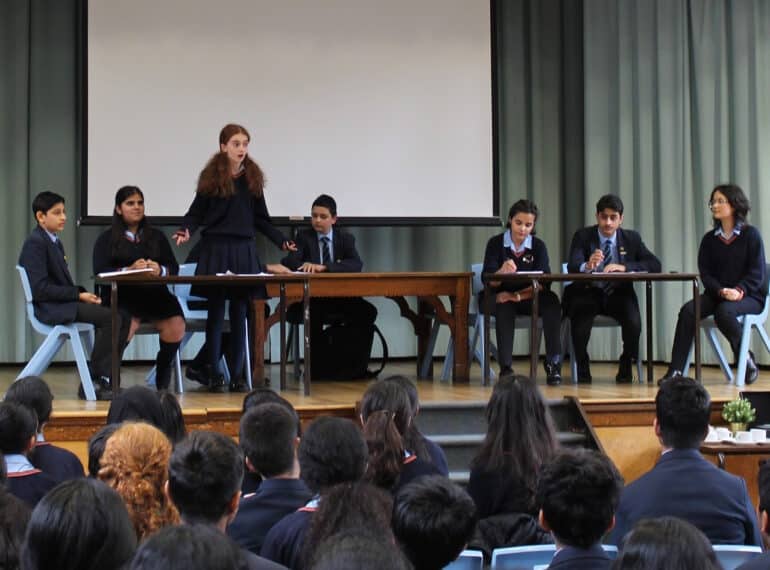
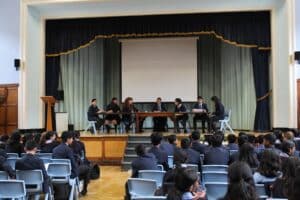 After the initial quickfire rounds, the morning with the guests from The Henrietta Barnett School (HBS) culminated in a final impassioned debate on the motion This House believes it was right to arrest the protesters at the King’s coronation.
After the initial quickfire rounds, the morning with the guests from The Henrietta Barnett School (HBS) culminated in a final impassioned debate on the motion This House believes it was right to arrest the protesters at the King’s coronation.